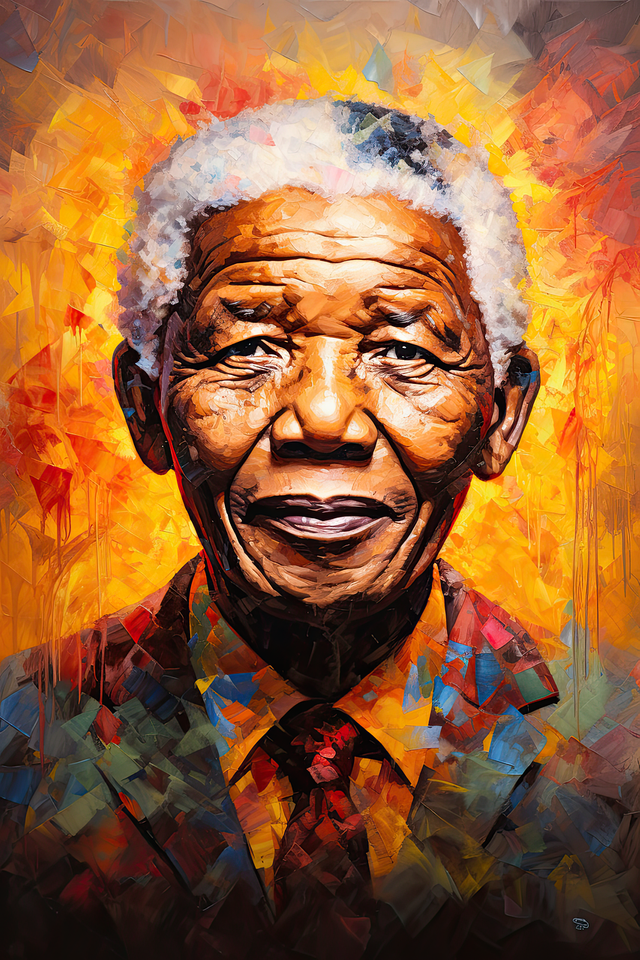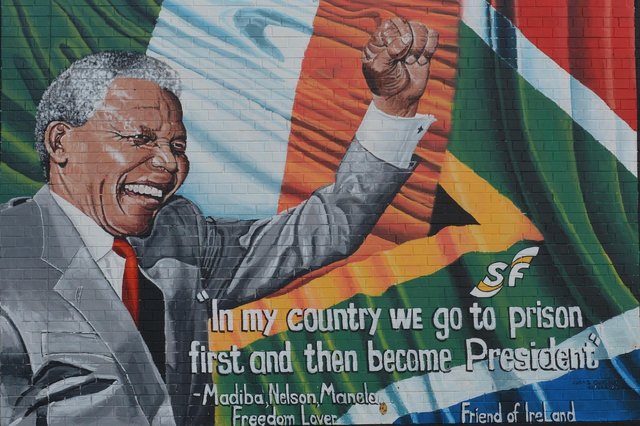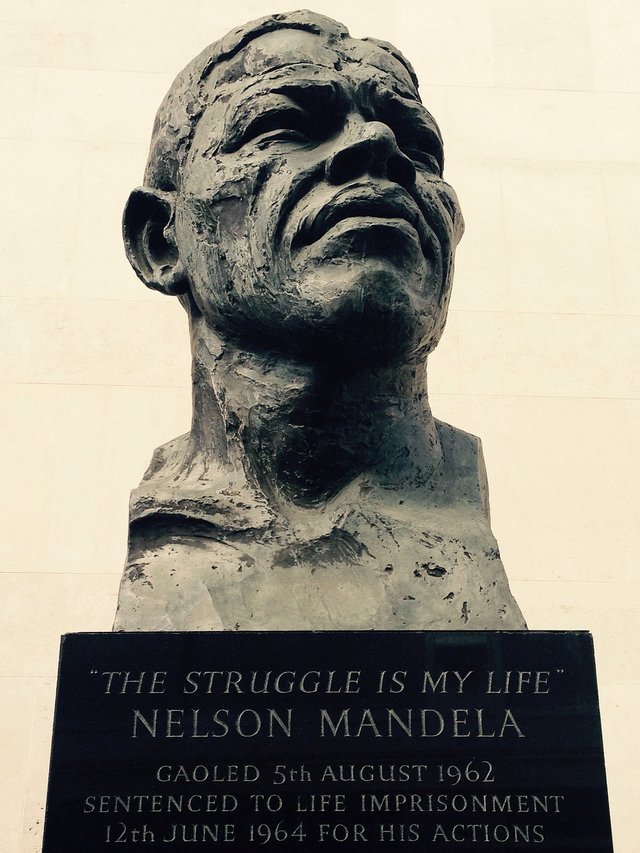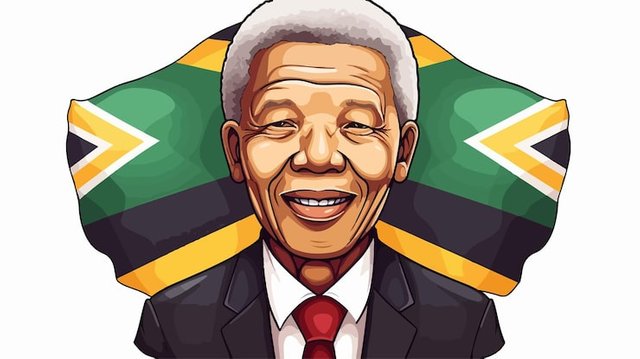Historical Figures
INTRODUCTION
Some people don’t just show up in history books they shape them. Nelson Mandela was one of those people. You can’t reduce him to just a title or a quote. He wasn’t perfect. He wasn’t trying to be a saint. But in a world that needed a steady, human voice during a time of chaos, he showed up. He gave all of himself his youth, his freedom, his energy for the sake of justice. And somehow, he still came out of all that willing to forgive.
Growing up, I saw his face on the newspapers , his quotes on posters. But it wasn’t until I really started to understand what he went through what he chose not to do when he finally had power that I realized how rare his kind of strength truly was.
What surprises you most about the person you've chosen?
What I can’t get over, even now, is how Mandela forgave people who tried everything to break him. Not just politically they went after his life, his family, his future.Twenty-seven years. Let that sink in.
And after all of that? He walked out of prison calm, steady. No angry speeches. No thirst for revenge. Just a quiet force of a man who had every reason to hate but didn’t.
He wasn’t naive. He didn’t forget the pain. He just refused to carry it forward.
That still amazes me. Because most people, even over small things, hold grudges. Mandela? He faced the people who once saw him as a threat — and said, “Let’s find a way to move forward together.” That takes more strength than shouting ever could. That kind of forgiveness? It’s not weakness. It’s power.
What do you consider to be their most significant achievement?
Most people talk about Mandela becoming the first Black president of South Africa — and yes, that moment changed everything. But for me, the real achievement was what he chose to do with that position.
He could have ruled with anger. He could have punished those who upheld apartheid. But he didn’t.
He used his time in office to bring people together. Not just in speeches, but in action. He helped create the Truth and Reconciliation Commission — a space where people could talk about the horrors of apartheid openly. Victims told their stories. Abusers confessed. It wasn’t perfect, but it gave the country a place to start healing.
Mandela didn’t erase history. He didn’t pretend everything was fine. He looked at the truth, raw and painful as it was, and made room for others to do the same. That kind of leadership doesn’t just change a country — it changes hearts.
Provide a brief biography related to your character.
Nelson Mandela was born in 1918 in a small South African village called Mvezo. His name, Rolihlahla, is sometimes translated as “troublemaker.” And in a way, that fits — but not because he liked to stir chaos. He never gave in for injustice.
He came from a family of local royalty and grew up learning both tribal customs and Western education. He studied law, and by the time he entered public life, he was already deeply aware of the oppression happening around him. Apartheid wasn’t just unfair — it was brutal, calculated, and dehumanizing.
Mandela was part of the African National Congress (ANC) and started out believing in peaceful protest. But after the Sharpeville massacre — when police opened fire on unarmed protesters — Mandela realized peaceful tactics alone might not be enough. That’s when he co-founded Umkhonto we Sizwe, a militant group that focused on sabotaging government infrastructure (never targeting lives).
In 1962, he was arrested. After 2 years he was sentenced to life in prisonment.
He spent 18 of those years on Robben Island — a place of isolation, hard labor, and humiliation. But even in prison cell, he still remained a leader. Inmates looked up to him. Guards respected him. And the world slowly began to see him as a symbol of the fight for freedom.
In 1990, he was released. Just four years later, after South Africa’s first democratic election, he became president.
But here’s what still impresses me: he didn’t cling to power. He served one term. Then he stepped aside — quietly, with grace. No ego. No drama. Just a man who had done his part and trusted the future to others.
Mandela passed away in 2013, but his voice still echoes.
If that character had social media, what type of content would they share?
Try to picture Mandela on Instagram or X. It’s strange, right? so private in a way. I don’t see him chasing likes or using hashtags to stay relevant.
If anything, his posts would be few but powerful.
On Twitter he’d probably post once a week, maybe less. No rants. No arguments. Just clear, intentional words like:
“Forgiveness is the first step to freedom.”
On Instagram? He wouldn’t care for filters. His posts would tell stories. A photo from Robben Island, with a quiet reflection. An image of schoolchildren in a dusty classroom. A handshake between two former enemies. Always about others — never about himself.
Maybe a short video now and then. Not to impress — to inspire.
That’s how I imagine his feed: simple, human, and powerful without ever trying to be.
| Final Words |
|---|
Some historical figures shout their way into the spotlight. Mandela didn’t. He didn’t need to.
He didn’t come out of prison angry. He didn’t build his future on revenge. He made room for hope — for everyone. Even for those who once called him enemy.
He taught the world something we still need today: that real leadership is about lifting others.
There are a lot of names in history. But Mandela’s is different. Not because he was perfect, but because he stayed human. Through everything.
I invite @kwinberry @marito74 @imohmitch to take part in this contest.
versión en español
INTRODUCCIÓN
Algunas personas no solo aparecen en los libros de historia, sino que les dan forma. Nelson Mandela fue una de esas personas. No puedes reducirlo a solo un título o una cita. Él no era perfecto. Él no estaba tratando de ser un santo. Pero en un mundo que necesitaba una voz humana constante durante una época de caos, apareció. Dio todo de sí mismo su juventud, su libertad, su energía por el bien de la justicia. Y de alguna manera, él todavía salió de todo eso dispuesto a perdonar.
Al crecer, vi su rostro en los periódicos , sus citas en carteles. Pero no fue hasta que realmente comencé a entender por lo que pasó lo que eligió no hacer cuando finalmente tuvo poder que me di cuenta de lo raro que era realmente su tipo de fuerza.
¿Qué es lo que más te sorprende de la persona que has elegido?
Lo que no puedo superar, incluso ahora, es cómo Mandela perdonó a las personas que intentaron todo para quebrantarlo. No solo políticamente fueron tras su vida, su familia, su futuro.Veintisiete años. Deja que eso se hunda.
¿Y después de todo eso? Salió de la prisión tranquilo, firme. Nada de discursos enojados. Sin sed de venganza. Solo una fuerza silenciosa de un hombre que tenía todas las razones para odiar pero no lo hizo.
Él no era ingenuo. No olvidó el dolor. Él simplemente se negó a llevarlo adelante.
Eso todavía me sorprende. Porque la mayoría de la gente, incluso por cosas pequeñas, guarda rencor. ¿Mandela? Se enfrentó a las personas que alguna vez lo vieron como una amenaza y dijo: "Encontremos una manera de avanzar juntos."Eso requiere más fuerza de la que podrían tener los gritos. ¿Ese tipo de perdón? No es debilidad. Es poder.
¿Cuál consideras que es su logro más significativo?
La mayoría de la gente habla de que Mandela se convirtió en el primer presidente negro de Sudáfrica, y sí, ese momento lo cambió todo. Pero para mí, el verdadero logro fue lo que eligió hacer con ese puesto.
Él podría haber gobernado con ira. Podría haber castigado a quienes defendieron el apartheid. Pero no lo hizo.
Usó su tiempo en el cargo para unir a la gente. No solo en discursos, sino en acción. Ayudó a crear la Comisión de la Verdad y la Reconciliación, un espacio donde la gente podía hablar abiertamente sobre los horrores del apartheid. Las víctimas contaron sus historias. Los abusadores confesaron. No fue perfecto, pero le dio al país un lugar para comenzar a sanar.
Mandela no borró la historia. Él no fingió que todo estaba bien. Miró la verdad, cruda y dolorosa como era, y dejó espacio para que otros hicieran lo mismo. Ese tipo de liderazgo no solo cambia un país — sino que cambia los corazones.
Proporcione una breve biografía relacionada con su personaje.
Nelson Mandela nació en 1918 en un pequeño pueblo sudafricano llamado Mvezo. Su nombre, Rolihlahla, a veces se traduce como " alborotador."Y en cierto modo, eso encaja, pero no porque le gustara provocar el caos. Él nunca cedió ante la injusticia.
Provenía de una familia de la realeza local y creció aprendiendo tanto costumbres tribales como educación occidental. Estudió derecho y, cuando ingresó a la vida pública, ya estaba profundamente consciente de la opresión que ocurría a su alrededor. El apartheid no solo fue injusto — fue brutal, calculado y deshumanizante.
Mandela formó parte del Congreso Nacional Africano (CNA) y comenzó creyendo en la protesta pacífica. Pero después de la masacre de Sharpeville, cuando la policía abrió fuego contra manifestantes desarmados, Mandela se dio cuenta de que las tácticas pacíficas por sí solas podrían no ser suficientes. Fue entonces cuando cofundó Umkhonto we Sizwe, un grupo militante que se centró en sabotear la infraestructura gubernamental(nunca atacando vidas).
En 1962, fue arrestado. Después de 2 años fue sentenciado a cadena perpetua.
Pasó 18 de esos años en Robben Island, un lugar de aislamiento, trabajos forzados y humillación. Pero incluso en la celda de la prisión, seguía siendo un líder. Los reclusos lo admiraban. Los guardias lo respetaban. Y el mundo lentamente comenzó a verlo como un símbolo de la lucha por la libertad.
En 1990, fue puesto en libertad. Apenas cuatro años después, tras las primeras elecciones democráticas de Sudáfrica, se convirtió en presidente.
Pero esto es lo que todavía me impresiona: él no se aferró al poder. Cumplió un mandato. Luego se hizo a un lado, en silencio, con gracia. Sin ego. Sin drama. Solo un hombre que había hecho su parte y confiado el futuro a otros.
Mandela falleció en 2013, pero su voz aún resuena.
Si ese personaje tuviera redes sociales, ¿qué tipo de contenido compartiría?
Intenta imaginarte a Mandela en Instagram o X. Es extraño, ¿verdad? tan privado de alguna manera. No lo veo persiguiendo me gusta o usando hashtags para mantenerse relevante.
En todo caso, sus puestos serían pocos pero poderosos.
En Twitter probablemente publicaría una vez a la semana, tal vez menos. Nada de despotricar. Sin argumentos. Solo palabras claras e intencionales como:
"El perdón es el primer paso hacia la libertad.”
¿En Instagram? No le importarían los filtros. Sus publicaciones contarían historias. Una foto de Robben Island, con una reflexión tranquila. Una imagen de escolares en un aula polvorienta. Un apretón de manos entre dos antiguos enemigos. Siempre sobre los demás, nunca sobre sí mismo.
Tal vez un video corto de vez en cuando. No para impresionar — para inspirar.
Así es como me imagino su alimentación: simple, humana y poderosa sin intentar serlo nunca.
| Palabras finales |
|---|
Algunas figuras históricas se abren paso a gritos hacia el centro de atención. Mandela no lo hizo, no necesitaba hacerlo.
No salió enojado de la cárcel. Él no construyó su futuro sobre la venganza. Dejó espacio para la esperanza, para todos. Incluso para aquellos que alguna vez lo llamaron enemigo.
Le enseñó al mundo algo que todavía necesitamos hoy: que el verdadero liderazgo se trata de elevar a los demás.
Hay muchos nombres en la historia. Pero la de Mandela es diferente. No porque fuera perfecto, sino porque seguía siendo humano. A través de todo.
Invito a @kwinberry @marito74 @imohmitch a participar en este concurso.




Upvoted! Thank you for supporting witness @jswit.
Has seleccionado a un personaje al cual muchos admiramos por esa determinación, sabiduría, un patriota, un gran ser humano que amo a su país, describes esa esencia tan bonita de el que despierta aún más admiración de mi parte, ha dejado un gran legado, una lección de vida para todos.
Era un gran hombre, sin duda. Gracias por tu maravillosa reseña.
Endeavor to engage with other uses and leave meaning comments on their posts at least 50 words. In that way you add value to the ecosystem and also build good relationships. Also upvote others users to ensure that your voting CSI is >5.
Curated by: @ashkhan